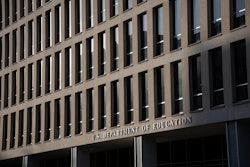A blue-ribbon panel of educators called Wednesday for a national effort to raise college completion rates among younger Americans, particularly students of color, to reverse a downward trend that is leaving the United States far behind other industrialized nations.
Once ranked second in the world in young adults with a college degree, the United States is now 11th among industrial nations, said members of a 28-member commission convened by the College Board.
U.S. high school completion rates also are below many international competitors
The report is “a plea, a call and an alarm” to invest more in education across the United States, said James Wright, Dartmouth College president, at a Washington, D.C., news conference.
The Commission on Access, Admissions and Success in Higher Education called for a national effort from preschool through higher education to raise college completion rates among Americans ages 25 to 34. The panel set a goal that 55 percent of young adults attain a community college degree or higher by 2025; the current rate is about 40 percent.
To support the goal, the panel seeks more need-based grant aid and a streamlined college admissions process. But many recommendations have a K-12 emphasis, with calls for improved middle and high school counseling, stronger dropout prevention programs and improved teacher recruitment and retention practices. All low-income children also should have access to quality preschool to help youngsters start school effectively.
“In urban education, we know that children enter the system with deficits,” said Joyce Brown, manager of secondary school counselors for the Chicago Public Schools, a commission member. School counselors also need the time and training to focus less on day-to-day school concerns and more on preparing young people for college.















